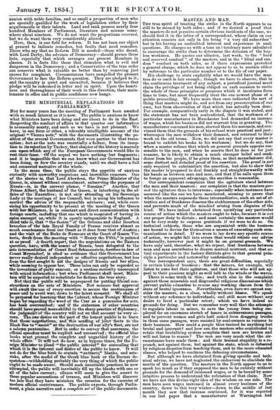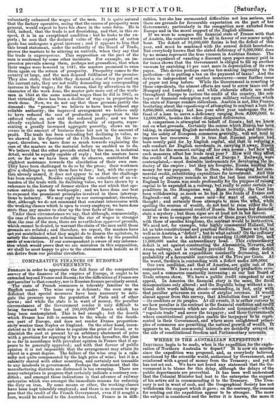MASTER AND MAN.
Tire true spirit of treating the strike in the North appears to us still to be missed by both sides ; and if we desired a proof that the masters do not perceive certain obvious incidents of the ease, we should find it in the letter of a correspondent, whose claim on our attention consists not only in his being " a very old subscriber" but in his having an undoubted interest and experience in such questions. He charges us with a tone an I tendency more calculated to encourage the strike than to determine the delusion of the hap- less workmen. He quotes our allusion, last week, to the " hard and reserved conduct " of the masters, and to the A' blind and ran- dom " conduct on both sides, as if those expressions provoked a general charge, which he does not appear to us to sustain either by reference to the particular number or to the file of our paper. His challenge to state explicitly. what we would have the mas-
ters do or omit is fair enough ; though we have to observe, that in the continuous treatment of any subject, a periodical journal must claim the privilege of not being obliged on each occasion to recite the whole of those principles or purposes which it inculcates from time to time, but must frequently treat the one newest phase of a public proceeding. We have more than once indicated the sort of thing that masters might do, and not from any preconception of our own, but from observation of that which has actually been done. For example, comparatively early in the dispute it was stated, and the statement has not been contradicted, that the workmen of a particular. manufacturer in Manchester had demanded an inerease -of wages, which his business did not warrant him in granting. The manufaeturer convened his men, showed them his accou,nts, and con- vinced them that the grounds of his refusal were practical and just; whereupon the men withdrew their demand, and returned to their -work on the old terms. Now, we did not say that every master is .bound to exhibit his books to his workmen ; but we do say, that when a master refuses that which on general grounds appears rea- -sortable to the men, and when he asserts that he does so for just reasons, he is likely -to obtain a much stronger belief and confi- dence from his people, if he gives them, as thatmanufaeturer did, some distinct and detailed proof of his assertion. The proof is not only required to substantiate the assertion, but also to show that the master is-prepared to deal frankly and straightforwardly with his hands as between man and man, and that if he calls upon them to forego an apparent advantage, the sacrifice is reasonable. - Our correspondent-complains that the agitators stand between -the men and theirmasters : our complaint is that the masters pee- mit the agitators thus to intervene; especially when instances have -occurred like the one we have mentioned, seeming to prove that when the masters supersede these intermediaries, such an act of at- tention and of frankness disarms-the stubbornness of the other side, and prevents m-uch of the mischief arising from disputes of the kind. We have indeed abstained from specifying any particular course of action which-the masters ought to take, because it is not our proper duty to dictate ; and most certainly the masters would not lie very ready to express gratitude if we were to-do so. On -technical subjects, those who are acquainted with, the business are -bound to devise for-themselves a means of executing such com- munications in detail. If we were to lay down any specific course of action, we might-fall into errors that would vitiate our advice technically, however just it -might he- on general grounds. We -have only said, therefore, what we repeat, that frankness between man and man contributes to disarm mutual mistrust, and -that ac- tual experiments in the factory districts give to that general prin- ciple a particular and noteworthy confirmation.
Our correspondent says, there- are great diffieulties, -especially in certain kinds of business-; that-the miners, for example, will listen to none but their agitators, and thatthose.who
peal to 'their passions might as well talk to the -winds or the-waves. There is some -truth in this ; and truth also in the complaint against-those miserable and disgraceful redigiouredissensions which prevent publio education to rescue any working classes from this state of brutal ignorance. Nevertheless, even here-we cannot con- eider the masters, as a class, wholly-without blame. We speak without any reference-to individuals, and-still more without any desire to level a particular • retort; which we have indeed no grounds for doing. But we remember :very well that the attempts to regulate labour in mines, to save the young from being em- ployed for an enormous stretch of luaus in subterranean passages, and to prevent women and girls half naked from dragging trucks in those same passages, were resisted by ooalowners as ruinous to their business. How could a people thustrained be anything hut brutal and ignoranti and how can the masters who contributed to retain that brutalizing system complain that men are brutes and will not listen to reason ? The men are -very much what the .eir- eumstanoestave made them ; and their trained stupidity is a re- proach, not against them, but against the state, which is debarred by religious-disputes from teaching them, and to the more educated classes, who helped to continue the debasing circumstances.
But although we have abstained from giving specific and tech- nical advice-, we have not neglected the endeavour to elucidate the merits of the question. The masters in the North appear to to speak too much as if they supposed the men to be entirely -without grounds for the demand of increased wages, or to be bound bysome intuitive process to understand the refutation of that claim Now we have not this divine-right idea of the wisdom on one side. The men have seen wages increased in almost every business of the country, down to this very winter—down to the middle of last month they saw that increase continued, for it was reported in our last paper that a manufacturer at Warrington bad voluntarily enhanced the wages of the men. It is quite natural that the factory operative, seeing that the causes of prosperity were general, would expect to have his share in the same form. He is told, indeed, that the trade is not flourishing, and that, in this re-
spect, it is in an exceptional condition : but he looks to the exports; he sees that the declared value of the exports of cotton
goods has undergone a great increase ; and it appears to him that this broad statement, wider the authority of the Board of Trade,, proves the masters to be uttering an untruth, 'when they say that the trade is unprosperous. This supposition on the part of the men is confirmed by some other incidents. For example, an im- pression prevails among them, perhaps not groundless, that when their wages were lowered in 1847, the masters promised to raise them again on the return Of. prosperity. Prosperity comes to the
cOtintry nt large, and the men demand fulfilment of the promise:. They also state, that while they demand a rise of ten per cent on thectirrentrate, they are not really demanding any corresponding increase in their wages; for the reason, that by alterations in the character of the work done, the master gets more out of the work- men in 18,54 at the same nominal wages than he did in 1847, so that virtually there has been a decline of wages in proportion to work done. Now, we do not say that these grounds justify the demand : the "promise" -we believe to have been without any rebel* authority; the improved arrangement we believe only to have reduced the cost of production in proportion to the rçduced value on sale and the reduced proht; and we have fitly explained how the declared value of exports, repre- senting a greatly increased aggregate quantity, shows an in- crease in the amount of business done but not in the amount of profit. The trade has been extending but declining in value, as we, showed in the 'Spectator of the 17th December. In this re- spect, therefore, we have done as much towards explaining the case of the masters as the material before us enabled us to do. We believe that the other grounds stated by the men, in technical detail, would be equally capable of reply ; but the masters have nub; -so' far as we have been able to observe, contributed the al4ghtest assistance towards the elucidation of their own case. T y have been challenged to do so by the press ; their workmen give a:challenge ta meet then i face to face; but, with the excep- tion already named, it does not appear to us that the challenge has been accepted. Besides explaining the coincidence of an ex- tenaion of the trade with its declining value, we have shown by a reference to the history of former strikes the cost which that ope- ration lentails upon- the workpeople ; and we have done our best teaspound the prominent principles involved in these interrup- tions to industry. We may reply to our correspondent, therefore, that, although we do not command that constant intercourse with the working classes which is open to every employer, we have done more than any master to clear up the true facts of the case. Under these circumstances we say, that although, commercially, the case of the masters for refusing the rise of wages is stronger than, the case of the men, there are nevertheless apparent grounds, which cannot be denied, to-warrant the claim of the men until those grounds are refuted; and therefore, we repeat, the masters have not yet contributed what they might do to disarm the agitators, to satisfy the claimants, and to terminate the strike by the peaceful node of- oonviction. II our _correspondent is aware of any informa- tion which would prove that we are mistaken in this supposition, WC shidl be most happy to give to the statement such benefit as it- can derive from our peculiar circulation.























































 Previous page
Previous page